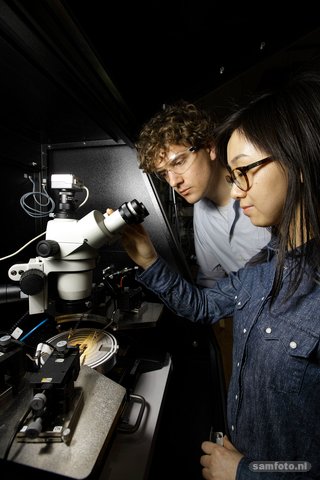Is an electronic nose possible? Will a hand prosthetic work through the user like a real hand? The students of the Organic Materials and Interfaces (OMI) lab say yes and they are currently working with the building blocks for these advancements today.
The Department of Chemical Engineering is housed in an older building slightly removed from the main TU Delft campus. Nostalgia reins as the narrow hallways weave towards the OMI lab. The doors open to a large, bright, traditional looking laboratory. Donning protective lenses, we are introduced to a machine that allows the students to study nanowires.
The OMI lab focuses on organic chemistry and nano-biosensors. Their goal is to add selectivity and sensitivity to sensor systems. “We don’t manufacture the nanowires. We use physical chemistry to modify them,” explains Ph.D. candidate Anping Cao of China. She uses silicon nanowires, jointly manufactured by EWI and Philips, as gas sensors in her research. Her research could eventually be used in that electronic nose previously mentioned. Each wire can detect a different gas or vapour. When bunched together, it can work like a real nose. “Nanowires can also be used to detect diseases like TB and influenza by detecting biomarkers of the disease,” explains Cao.
“We’re not engineers, we’re scientists. We don’t ask ‘how can we do this’, we ask ‘how does it work’,” says Ph.D. candidate Aldo Brinkman of the Netherlands. “The engineers around us make stuff and we use it,” continues Brinkman. His project is focused on silicon nanowires in liquid. The wires are used as sensors and also as connectors. His research could potentially be put to use in lifelike prosthetics, where the nanowires would work as bioelectric interfaces between the body part and the prosthetic.
The scientists of the OMI lab may see themselves a little differently from the largely engineering population at the TU Delft, but the research they are turning out is on par with the innovative and ingenious research we are accustom to seeing at the university.



Comments are closed.